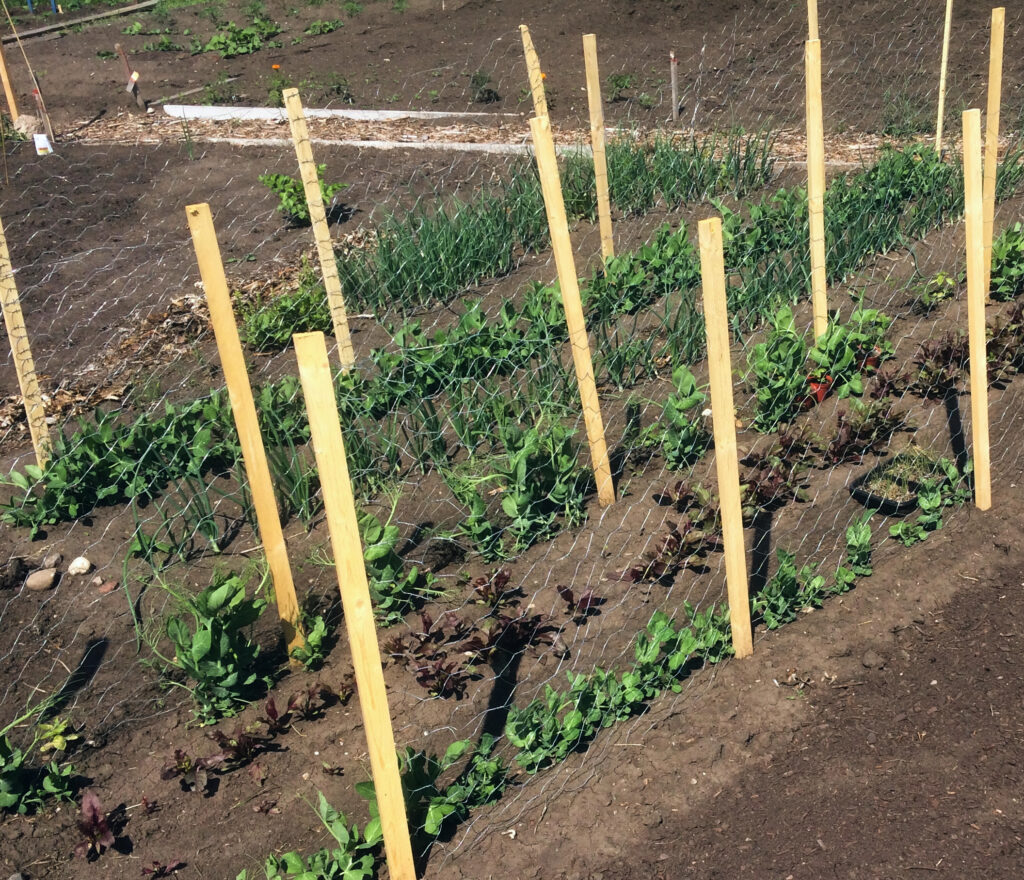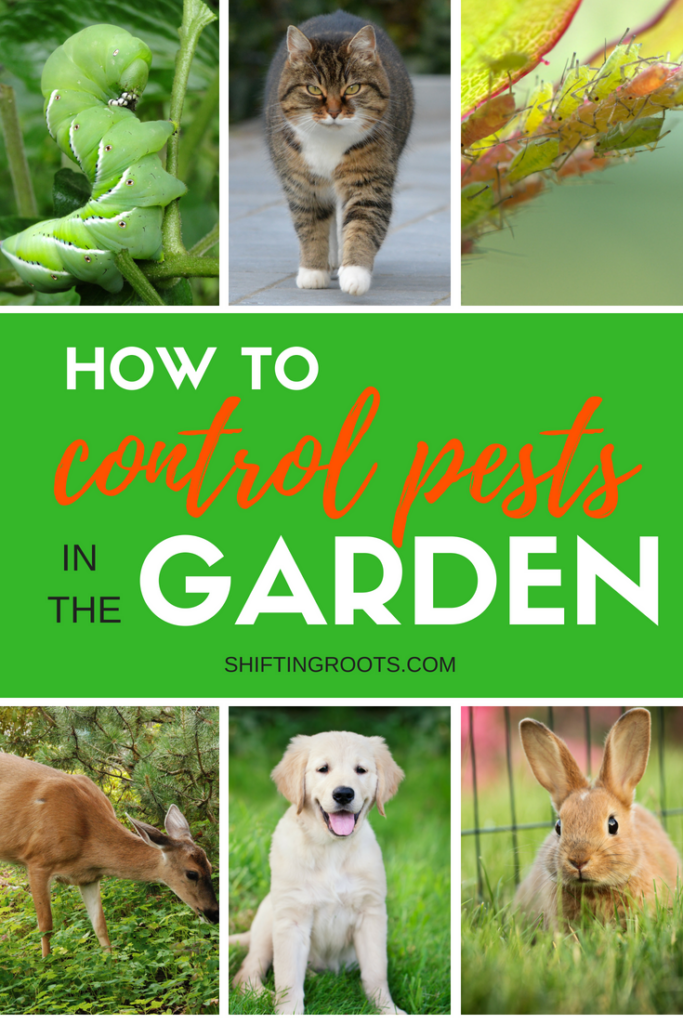You’ve planted the seeds, carefully watered and weeded, and your vegetable garden is finally starting to come up. . . only to be demolished by a host of bugs, birds, and other critters.
What’s a gardener to do?
Sifting through the Internet for answers is like travelling down some strange vortex. There’s so many myths and folk remedies out there that you don’t know what to believe–especially if you’re looking for an organic solution.
I have travelled the vortex for you and come out on the other side…barely. This post is a compilation of some of the more reputable solutions out there for the garden foes you are battling.
Disclaimer: I have not personally battled every single pest mentioned in this article. I wanted to create a jumping off point for you to find out more about the specific pest you’re battling. I garden in zone 3b, and it is impossible to know and experience every pest in North America. In this post I mention organic and natural solutions where possible, but not every gardener will agree with my definition of natural and safe. Pest control can be a heated subject in the gardening world–Please keep the comments civil. 🙂
Disclaimer Two: this post contains affiliate links, which means I earn a small commission on anything you purchase by clicking the link, at no extra cost to you. Thanks for keeping Shifting Roots running!
The Foundation for Pest Prevention
Before we go any further on the get-rid-of-pests path, we need to make sure you have a few basics in the garden down. A healthy soil goes a long way in keeping harmful bugs out of your garden, plus there’s a few simple things you can do early in the season (and now) to prevent further problems.
- Add an inch or two of compost and well-rotted manure to the soil
- Rotate your crops every year
- Water regularly, but not so much that you cause mold and rot
- Remove any diseased looking leaves of a plant and throw in the garbage–not your compost.
- Walk through your garden every day and observe any changes.
- Consider planting flowers among your vegetables to help with pollination and attract beneficial bugs.
Related: 8 Reasons You Kill Every Garden Plant You Touch
Obviously these steps are not going fix every garden issue–especially if your particular pest is a critter, not a bug. But they can go a long way in keeping your garden healthy. There are 4 basic categories of Garden Pests–bugs, rodents, birds, and critters. Let’s dive in.
How to Organically Control Insects in the Garden
There are 3 ways to get rid of bugs, slugs, and other small pests in the garden organically:
- Live with it, if the problem is not too severe
- Create a barrier, such as a fine mesh cover, around the plant.
- Remove the bugs by hand and destroy them
- Apply a homemade pesticide
- Apply a commercial organic pesticide.
Which method you choose will depend on the severity of the infestation and your comfort level with pesticides. For example, I live with a few holes in my kale because it’s still fine to eat, but I will use TBK for tent caterpillars to save my apple tree from ruin. One of the best books you can possible read on the subject is Gardening, Naturally by Sarah Williams and Hugh Skinner. Anything by Sarah Williams is well researched and a must-read for the Prairie Gardener. For those of you not on the Prairies, I recommend The Organic Gardener’s Handbook of Natural Pest and Disease Control.
Finally, I love this handy and comprehensive chart by Fix.com

How to Keep Birds From Eating All Your Vegetables
Out of all the possible pests you can have, birds are the biggest struggle in my garden. My super fancy birds like to eat my young beets, Swiss Chard, peas, and certain types of lettuce into oblivion.
If you grow fruit, you especially know the pain of having a bird bite in the middle of your ripe garden grown strawberry. I have to pick my sour cherries when they are not fully ripe, because if I don’t, I won’t get any!!
Here’s the four basic ways you can keep birds from eating everything.
Give the Birds Another Source of Food
Sometimes the simplest solution is to set out some bird food and a bird bath full of water.
Use a Reflective Surface
Birds get confused by flashing lights. Use an old pie plate, scratched CD, reflective pinwheels, or even strips of tinfoil to scare them away.
Use a Net or Covering
Cover your fruit trees with netting as it gets closer to harvest, or surround the vegetable you wish to protect with a fine mesh or cut up milk jug.
Set up a Scarecrow
Birds are terrified of owls. A plastic owl might be just the trick to keep the birds at bay.
Your Free Pest Tracker is Inside! Sign Up Below to Get Yours
Plan the Perfect Garden

Get your free Garden Planner and worksheets and start creating the garden of your dreams.
Deterring Rodents From Your Garden
Mice, rats, moles, voles, rabbits, gophers and more all love to eat in the garden just as much as we do. Here’s a few ways to keep them at bay.
Make a Pepper Spray
I’ll let you be the judge of whether this is ethical or not. If your ethics permit, here’s a recipe for all natural pepper spray from My Homestead Life, and one with vinegar and essential peppermint oil from My Own Home. You could also plant a lot of mint, but be prepared for it to take over your garden.
Mothballs
Many rodents dislike the smell of moth balls. Mix 4-6 mothballs with 3 cups of water and put in a container (like an old milk jug or pop bottle) with a few slits so the smell can get out.
Irish Spring Bar Soap
Shred the soap with a grater and sprinkle the pieces around the area you want the rodents and other small critters to stay away from. This post from Epic Gardening has some other great ideas for getting rid of rodents, and this one from Feathers in the Woods has some good ideas for rabbits.
Keeping Out Cats, Dogs, and Other Small Critters
There’s nothing more frustrating than planting your new garden, only to have your dog roll all over your new plants or some neighbourhood cat use it as a litter box! We love our pets, but they need to stay out of the garden!
My Garden Isn’t a Litter Box!!
Keep cats out of your garden by:
- Crushing eggshells and spreading them around the soil
- Sticking plastic forks, pinecones, or twigs in spaces that are big enough to dig
- Keeping the soil moist
- Spreading citrus peels or coffee grounds around the soil
- Planting catnip somewhere else so they leave your garden alone.
Or try some of the suggestions in this article.
Keep Dogs from Rolling and Digging
Some of the solutions that work for cats also work for dogs, like sticking twigs or pinecones in spaces that would be large enough to lay in. You can also build a small fence, or garden in taller raised beds.
Here’s 5 more ideas from Gardening Know-How that you can try.
Want a Free Pest Tracker? Download Your Free Garden Guide and Get Yours:
Plan the Perfect Garden

Get your free Garden Planner and worksheets and start creating the garden of your dreams.
How to Keep Deer From Destroying Your Garden
If you’d like to learn more about which plants deer love and despise, this list from the Farmer’s Almanac is quite comprehensive. However, there is no plant that is 100% deer proof. Sure, there are plants that deer don’t like as much, but if a deer is hungry enough it will eat the plant.
The only fail-safe way to keep deer out is to build a fence that is at least 2 meters high. Go higher if the deer population is high in your area. They’ll be more desperate for food and might even scale that height.
You can also try hanging bars of highly scented soap around your garden and yard.
When People are Problematic
It’s not often discussed, but people can be a pest in the garden. Stolen produce from the garden is WAY more common a problem than you might think. Often there isn’t much recourse, as it’s hard to prove who stole it and the police have more pressing issues to solve.
Sometimes a trail cam nearby can be a deterrent, or plant a small area right by your sidewalk with a sign that the produce in this spot is free for the picking.
Your only other solution is a fence with a lock.
What pest do you struggle the most with? Do you have any solutions you’ve tried that worked well? Tell us about it in the comments!!








Jenn
Mary Elizabeth VonDras
Melissa
Kristen Raney
G. Brumfield